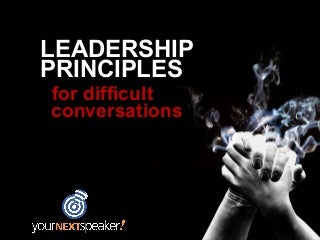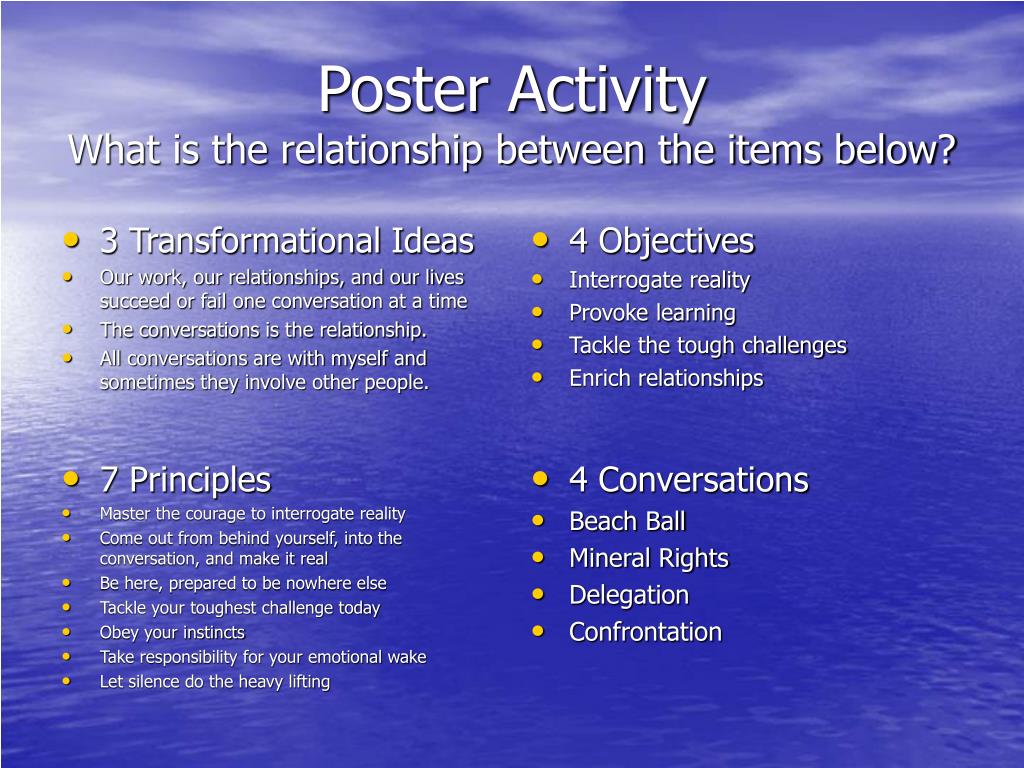
Slow down the conversation, so that insight can occur in the space between words and you can discover what the conversation really wants and needs to be about. Memorable conversations include breathing space. Principle 7: Let silence do the heavy lifting - When there is simply a whole lot of talking going on, conversations can be so empty of meaning they crackle. Learning to deliver the message without the load allows you to speak with clarity, conviction, and compassion. The conversation is not about the relationship the conversation is the relationship. Something you don’t remember saying may have had a devastating impact on someone who looked to you for guidance and approval. Principle 6: Take responsibility for your emotional wake - For a leader, there is no trivial comment. What we label as illusion is the scent of something real coming close. An intelligence agent is sending you messages every day, all day. Principle 5: Obey your instincts - Don’t just trust your instincts - obey them. Stay current with the people important to your success and happiness. Identify and then confront the real obstacles in your path. Principle 4: Tackle your toughest challenge today - Burnout doesn’t occur because we’re solving problems it occurs because we’ve been trying to solve the same problem over and over. Speak and listen as if this is the most important conversation you will ever have with this person. While no single conversation is guaranteed to transform a company, a relationship, or a life, any single conversation can. Principle 3: Be here, prepared to be nowhere else - Our work, our relationships, and our lives succeed or fail one conversation at a time. You will accomplish your goals in large part by making every conversation you have as real as possible. When the conversation is real, the change occurs before the conversation is over. No one has to change, but everyone has to have the conversation. Unreal conversations are expensive, for the individual and organization. Principle 2: Come out from behind yourself into the conversation and make it real - While many fear “real,” it is the unreal conversation that should scare us to death. Not only do we neglect to share this with others, we are skilled at masking it even to ourselves. People change and forget to tell each other - colleagues, customers, spouses, friends.

Markets and economies change, requiring shifts in strategy. Principle 1: Master the courage to interrogate reality - No plan survives its collision with reality, and reality has a habit of shifting, at work and at home.

Scott promotes Seven Principles of Fierce Communication: Scott offers her insight into this process. But if what you’re thinking makes you squirm and wish to wriggle away, you are probably onto something.” (177) The discomfort is usually a signal that a conversation needs to occur. Scott affirms what all know, “It takes a certain fearlessness to make your private thoughts public. Resources like this will help, though one should count the cost and practice the skills with pastoral sensitivity. But church leaders who are serious about missional effectiveness or realize the widespread detrimental effect of recurring problems will welcome help in creating a climate of openness about what really matters. And most churches prize niceness over truthfulness, which is unfortunate. Most are not “bottom line” oriented enough for the stakes to be as high as in a typical business.

Not all churches will be open to the level of candor encouraged by these resources. It represents over 13 years and 10,000 hours of helping business executives tackle tough issues and make hard decisions.

This Wall Street Journal best seller is based on Susan Scott’s internationally recognized consulting practice, Fierce Conversations. Referenced in: Church Conflict - Criticism, Difficult People, Difficult Conversations Susan Scott, Fierce Conversations: Achieving Success at Work and in Life, One Conversation at a Time.


 0 kommentar(er)
0 kommentar(er)
